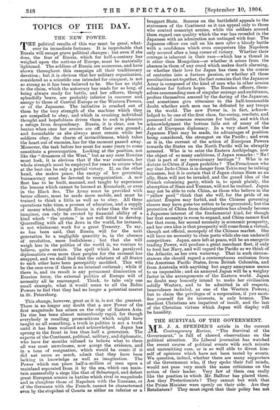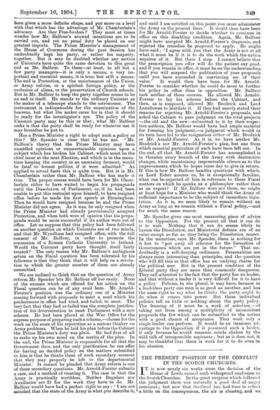M R. J. A. SPENDER'S article in the current Contemporary Review,
"The Survival of the Government," is full of shrewd observations on the political situation. No Liberal journalist has watched the recent course of political events with such minute and unremitting care, or is so well able to divest him- self of opinions which have not been tested by events. We question, indeed, whether there are many supporters of the Government who, if they spoke their full minds, would not pass very much the same criticisms on the action of their leader. Very few of them can really like the position in which Mr. Balfour has placed them. Are they Protectionists ? They cannot but wish that the Prime Minister were openly on their side. Are they Retaliators ? They must regret that their policy has not been given a more definite shape, and put more on a level with that which has the advantage of Mr. Chamberlain's advocacy. Are they Free-fooders ? They must at times wonder how Mr. Balfour's avowed intentions are to be carried out, and yet no penal duty be placed on our greatest imports. The Prime Minister's management of the House of Commons during the past Session has undoubtedly kept his party, or rather his majority, together. But it may be doubted whether any section of Unionists have quite the same devotion to this great end as Mr. Balfour. To them—at least, to all but a few party managers—it is only a means, a very im- portant and essential means, it is true, but still a means. The end is Protection, or the maintenance of the Union, or Army reform, or a spirited foreign policy, or the exclusion of aliens, or the preservation of Church schools. But to Mr. Balfour to keep the party together seems to be an end in itself. He stands to the ordinary Unionist as the maker of a telescope stands to the astronomer. The instrument is indispensable for the examination of the heavens, but what the maker cares for is that it should be ready for the investigator's eye. The policy of the Unionist party may be this or that ; what Mr. Balfour seeks is that the party shall be ready for whatever use it may hereafter be put to.
Has a Prime Minister a right to adopt such a, policy as this ? Mr. Spender is clear that he has not. "Mr. Balfour's theory that the Prime Minister may have unsettled opinions or unascertainable opinions upon a subject which has broken his Cabinet, which must be the chief issue at the next Election, and which is in the mean- time keeping the country in an unceasing ferment, would be fatal to honest politics if it were admitted." As applied to actual facts this is quite true. But it is Mr. Chamberlain rather than Mr. Balfour who has made it true. The proper course would have been for Mr. Cham- berlain either to have waited to begin his propaganda until the Dissolution of Parliament, or, if he had been unable to put this restraint upon himself, to have resigned office before he made his first speech at Birmingham. Then he would have resigned because he and the Prime Minister did not agree. As it was, he only resigned when the Prime Minister had already provisionally accepted Protection, and when both were of opinion that his propa- aanda would be more successful if its author were out of office. Let us suppose that this policy had been followed on another question on which Unionists are of two minds, and that Mr. Wyndham had resigned office, with the full consent of Mr. Balfour, in order to promote the concession of a Roman Catholic University to Ireland. Would the Unionist party have thought itself fairly treated? The only reason why Mr. Balfour's ambiguous action on the Fiscal question has been tolerated by his followers is that they think that it will help on a, revolu- tion to which the greater number of them are already committed.
We are inclined to think that on the question of Army reform Mr. Spender lets Mr. Balfour off too easily. None of the excuses which are offered for his action on the Fiscal question can be of any avail here. Mr. Arnold- Forster's position was the ordinary one of a Minister coming forward with proposals to meet a need which his predecessors in office had tried, and failed, to meet. The very fact that they had so failed was the complete justifica- tion of his determination to meet Parliament with a new scheme. He had been placed at the War Office for the express purpose of preparing such a scheme,—chosen for the work on the score of his reputation as a serious thinker on Army problems. When he laid his plan before the Cabinet the Prime Minister's duty was plain. He had first of all to make up his own mind on the merits of the plan. In the end, the Prime Minister is responsible for all that the Government does, and the only justification he can offer for having no decided policy on the matters submitted to him is that he thinks them of such secondary moment that they may properly be left to the departmental Minister. It cannot be pleaded that Army reform is one of these secondary questions. Mr. Arnold-Forster submits a case, and a method of treating it. The case is that the Army is practically worthless. Neither Regulars nor Auxiliaries are fit for the work they have to do. Mr. Balfour would have had a perfect right to say : I am not satisfied that the state of the Army is what you describe it, and until I am satisfied on this point you must ad minister the Army on the present lines.' It would then have been for Mr. Arnold-Forster to decide whether to continue in office on this disabling condition. Again, Mr. Balfour might have accepted Mr. Arnold-Forater's clinenosis, and rejected the remedies he proposed to apply. He might have said : I agree with you that the Army is not at all what it must be if it is to do the work which the nation requires of it. But there I stop. I cannot believe that the prescription you offer will do the patient any good, and if you remain in office, it must be on the understanding that you will suspend the publication of your proposals until you have succeeded in convincing me of their value.' It would then have been for Mr. Arnold- Forster to consider whether he could do more to further his policy in office than in opposition. Mr. Balfour took neither of these courses. He allowed Mr. Arnold- Forster to lay his scheme before the Cabinet, and then, as is supposed, allowed Mr. Brodrick and Lord Lansdowne to mutilate it. If they had merely stated their reasons for rejecting Mr. Arnold-Forster's proposals, and asked the Cabinet to pass judgment on the rival projects —the old and the new—submitted to it by their respec- tive authors, Mr. Balfour would have had ample material for forming his judgment,—a judgment which would in its turn have led to the resignation either of Mr. Brodrick or Mr. Arnold-Forster. As it is, we have neither Mr. Brodrick's nor Mr. Arnold-Forster's plan, but one from which essential particulars of each have been left out. In the end, all that Mr. Arnold-Forster has accomplished is to threaten every branch of the Army with destructive changes, while maintaining impenetrable silence as to the improvements which he hopes some day to give in return. If this is how Mr. Balfour handles questions with which, as Lord Esher assures us, he is exceptionally familiar, what can be expected of him in reference to those Fiscal matters on which he speaks as a philosopher rather than as an expert? If Mr. Balfour were not there, we might at least hope for a Minister who would think the Army of sufficient importance to be the subject of immediate legis- lation. As it is, we seem likely to remain without an Army as long as we remain without a Fiscal policy,—and for much the same reason.
Mr. Spender gives one most reassuring piece of advice to the Opposition. For the present all that it can do is to wait. Nothing that it can do seems likely to hasten the Dissolution, and Ministerial defeats are of no value except so far as they bring the Dissolution nearer. In the meantime, says Mr. Spender, there is nothing for it but to "put away all schemes for the formation of Governments which are yet in the future." That un- doubtedly is a self-denying ordinance. Personalities are always more interesting than principles, and the question who will fill this or that office has an undying charm for the political seer. But in the present condition of the Liberal party they are more than commonly dangerous. They call attention to the fact that the party has no leader, and that without a leader it is very difficult for it to have a policy. Policies, in the plural, it may have, because in a leaderless party one man is as good as another, and has the same right to say what he thinks the party ought to do when it comes into power. But these individual policies tell us little or nothing about the party policy. The framing of it must be a work of selection,—of taking out from ammo'° a multiplicity of inconsistent proposals the few which can be submitted to the nation with a good chance of acceptance. That work only a single leader can perform. It would be an immense ad- vantage to the Opposition if it possessed such a leader, if only because he would reassure minds shaken by the wild talk of irresponsible aspirants ; but as it does not, it may be thankful that there is work for it to do even in his absence.



































 Previous page
Previous page